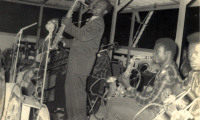Tanzanians with albinism speak through music
Tanzania Albinism Collective, a group of amateur musicians from Ukerewe Island, has released an album titled White African Power with the help of US scriptwriter and producer Ian Brennan.
 A member of the Tanzania Albinism Collective. Photo: Marilena Delli
A member of the Tanzania Albinism Collective. Photo: Marilena Delli Cover art for the White African Power album.
Cover art for the White African Power album.
“My parents abandoned me because I look the way I do/They say I am not their child, that I belong to the whites,” sings Amidu Didas Lucas in the song ‘Maishe Yangu’ (My Life).
Members of the collective say that locals refer to people living with albinism as ‘whites’, so instead of feeling bad about it they opted to name their album White African Power. Through the album, they seek to convey the pain and alienation they face from all sectors of society, including their families.
Brennan says that the title of the album is meant to be ironic and create a sense of discomfort. “They live in a society where skin whitening is used by some people and having lighter skin is seen by some as desirable. But being too white can get you killed,” he said.
In many African communities, especially those in the Great Lakes region, people with albinism are considered ‘ghosts’ whose body parts are believed to bring good luck. Many of them are killed at the orders of traditional healers who use albino body parts as ingredients in rituals and potions.
“Whenever I walk past people in my village they call me deal which means money,” Tanzania Albinism Collective singer and instrumentalist Thereza Phinias said. “They are referring to the widespread myths that the body parts of a person with albinism can make one rich. We with albinism stick out visibly among black people. We look very different, we cannot hide.”
In 2016, Brennan, who is best known for producing Tinariwen’s Grammy-winning album Tasili, travelled to Ukerewe, Africa’s largest inland island in Lake Victoria. The island is so remote that historically people travelled there to abandon children with albinism. Today the island serves as a haven for many with the condition. It was there that he learnt that a local group of residents with albinism was often not allowed to take part in community activities, including going to church.
Brennan undertook the recording project with the assistance of UK-based charity Standing Voice, which promotes inclusion of albinos in Tanzanian society. Over 11 days, he and his team rallied together a group of 20 members of the albino community on Ukerewe, all of whom were non-musicians, and tried to create music with them. But the producer said they encountered difficulties to get started. “It wasn’t like starting from zero but starting from negative zero with some of them, because they’d literally been shut down by other people,” Brennan told Newsweek. “There was this level of scar tissue that was there that we weren’t anticipating.”
Things eventually got off the ground when the members of the band began opening up. They then started writing and recording songs for the album after Brennan encouraged them to share their personal experiences through the music.
White African Power is Brennan’s latest in a string of projects that seek to give a voice to the voiceless. He previously worked on the Zomba Prison Project, a Grammy-nominated recording featuring music composed and performed by prisoners at the maximum security Zomba Central Prison in Zomba, Malawi. “The whole intention is to hear from individuals, the invisible, and learn from them. So our only directive was, ‘What do you want the world to know?'" he told NPR about his latest project.
The Tanzania Albinism Collective comprises Amidu Didas Lucas, Nyamsukula Riziki Biseko Julias, Thereza Phinias Mkaruka, Elias Sostenes Mbuguma and Katwale Bunoge Magaga. The band will also be performing in London at the end of July.
Here is a short documentary about the group, which was directed by Brennan's wife, Marilena Delli.
Buy White African Power on iTunes.























Comments
Log in or register to post comments